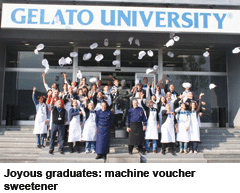What is the most popular thing in the world? Music, guessed Donald Trump. No, replied his interviewer, Ali G; it is ice cream. The problem, however, is that ice cream drips. The solution, said the British comedian, is to sell “ice cream gloves” to stop people’s hands getting sticky. The Donald somehow kept a straight face.
Carpigiani, an Italian firm which makes ice-cream machines, has a better business plan. Eschewing gloves, it is going into education. Its home market is saturated. Italy already boasts 37,000 artisanal gelatomakers. Since there are only so many scoops of bacio one nation can eat, exports are now 80 percent of Carpigiani’s business. Alas, most foreigners have no idea how to make a proper gelato. So Carpigiani has set up Gelato University to teach them.
 In well-lit classrooms and shiny kitchens in Anzola dell’Emilia, near Bologna, where Carpigiani has its factory, students from Russia, Belgium, Colombia, Morocco, Japan, Britain and Turkey are learning the secrets of selecting the perfect ingredients and freezing them. Lawrence Fama, a retired chemical engineer, hopes to set up an ice-cream shop in his home city of San Francisco. Corrado Barberis, an Italian economist, aims to take the real deal to Lille in northern France.
In well-lit classrooms and shiny kitchens in Anzola dell’Emilia, near Bologna, where Carpigiani has its factory, students from Russia, Belgium, Colombia, Morocco, Japan, Britain and Turkey are learning the secrets of selecting the perfect ingredients and freezing them. Lawrence Fama, a retired chemical engineer, hopes to set up an ice-cream shop in his home city of San Francisco. Corrado Barberis, an Italian economist, aims to take the real deal to Lille in northern France.
Most teaching is done abroad: Gelato University also holds courses in countries such as America, Australia and China. Andrea Cocchi, Carpigiani’s managing director, sees the best growth prospects in Asia and South America.
A week’s basic course in Anzola dell’Emilia costs students Euro 900 (Rs.64,732). There is a sweetener, however: a Euro 900 voucher for Carpigiani machines. For Gelato University is not just about making the world a cooler place. It is also a marketing tool, and a rather cost-effective one at that. The fees cover running costs, and more than 15 percent of students end up buying equipment. In the past three years student numbers have more than tripled, to about 6,700. Over the same period, Carpigiani’s sales have risen from Euro 93 million to Euro 113 million (roughly 8,000 machines). Sometimes the soft sell works.
(Excerpted and adapted from The Economist)























